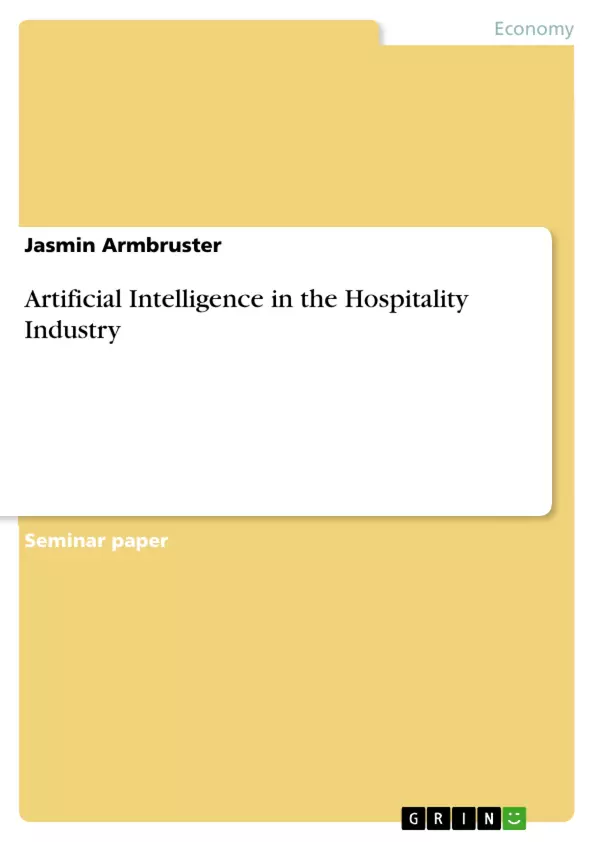Tourismus ist ein wichtiger Wirtschaftszweig und beschäftigt Millionen von Menschen weltweit. Die Zahl der Reisenden steigt kontinuierlich an und es ist kein Ende in Sicht. Diese Entwicklung beeinflusst zunehmend die Hotellerie, denn es entwickelt sich ein starker Wettbewerb zwischen kleinen und mittelständigen Hotels. Die Aufgabe der Hotels ist es also, möglichst rentable Kundenbeziehungen aufzubauen, um weiterhin am Markt präsent zu sein.
In der Vergangenheit reichte es aus, die Kunden zufrieden zu stellen, doch dies ist heutzutage längst nicht genug. Die Hotels müssen einen hervorragenden Service anbieten, um die Kundenwünsche zu übertreffen und sich dadurch einen Vorteil gegenüber der Konkurrenz zu verschaffen. Durch die technologischen Entwicklungen im Bereich Künstliche Intelligenz, gibt es immer mehr Möglichkeiten, die hierfür genutzt werden können. Der Einsatz von Maschine Learning, Natural Language Processing und Robotern bietet Hotelmanagern die nötigen Voraussetzungen. Der Dienstleistungssektor ist jedoch stark von Menschen geprägt und somit stellt sich die Frage, inwiefern Künstliche Intelligenz die Kundenzufriedenheit und das Erlebnis im Hotel verbessern kann.
Diese Hausarbeit widmet sich der beschriebenen Problematik und versucht durch eine Literaturrecherche die Thematik zu erforschen.
Inhaltsverzeichnis (Table of Contents)
- Introduction
- Theoretical Background
- Characteristics of the Hotel Industry
- Customer Experience in Hotels
- Artificial Intelligence in Hotels
- Best Practise Examples of Robotics
- Robotic Concierge at Hilton Hotel
- Henn-na Hotel in Japan
- Improvements of Customer Experience by using Artificial Intelligence
- Before the Trip
- During the Trip
- After the Trip
- Conclusion and Implications for Future Research
Zielsetzung und Themenschwerpunkte (Objectives and Key Themes)
This paper aims to explore the potential applications of Artificial Intelligence within the hotel industry to enhance customer experience. The focus is on identifying specific areas where AI can be implemented to improve customer interactions and create memorable experiences throughout the customer journey.
- The characteristics and challenges of the hotel industry, including competition and service quality.
- The importance of customer experience and its relationship with personalized services and emotional connection.
- The role of Artificial Intelligence in gathering, analyzing, and utilizing customer data to create personalized services.
- Real-world examples of hotels implementing AI-driven solutions, including robotic concierges and AI-powered guest services.
- The potential benefits of AI for improving customer experience at various stages of the travel journey.
Zusammenfassung der Kapitel (Chapter Summaries)
The first chapter introduces the hotel industry's context, highlighting its significance within the global economy and the growing need for innovation to remain competitive. It discusses the importance of customer experience and the potential of Artificial Intelligence to enhance it. The chapter also acknowledges the limited research on AI in the hospitality sector, especially focusing on hotels. The second chapter delves into the theoretical background of the hotel industry, customer experience, and Artificial Intelligence. It explores the unique characteristics of the hotel industry, emphasizing the need to improve service quality and customer loyalty. This chapter further explores the concept of customer experience in relation to personalized services and emotional connection with guests. Finally, it introduces Artificial Intelligence as a tool for collecting, analyzing, and utilizing customer data to personalize services. The third chapter presents best practice examples of hotels implementing robotics and AI-driven solutions. It showcases how these technologies are being utilized to improve guest experiences and enhance operational efficiency.
Schlüsselwörter (Keywords)
This paper focuses on Artificial Intelligence, customer experience, hotel industry, service quality, personalized services, robotics, and AI-driven solutions.
Frequently Asked Questions
How can Artificial Intelligence improve customer experience in hotels?
AI can personalize services by gathering and analyzing customer data, allowing hotels to exceed guest expectations throughout the customer journey.
What are some examples of AI used in the hospitality industry?
Examples include robotic concierges at Hilton Hotels and the fully automated Henn-na Hotel in Japan.
What technologies are part of AI in hotels?
The industry primarily utilizes Machine Learning, Natural Language Processing (NLP), and Robotics to enhance service quality.
At which stages of the trip can AI be implemented?
AI can be used before the trip (booking/planning), during the trip (guest services/concierge), and after the trip (feedback/loyalty).
Why is AI becoming necessary for hotels?
Increasing global competition and the need for highly personalized, emotional connections with guests make AI a vital tool for staying competitive.
- Quote paper
- Jasmin Armbruster (Author), 2018, Artificial Intelligence in the Hospitality Industry, Munich, GRIN Verlag, https://www.grin.com/document/498676



